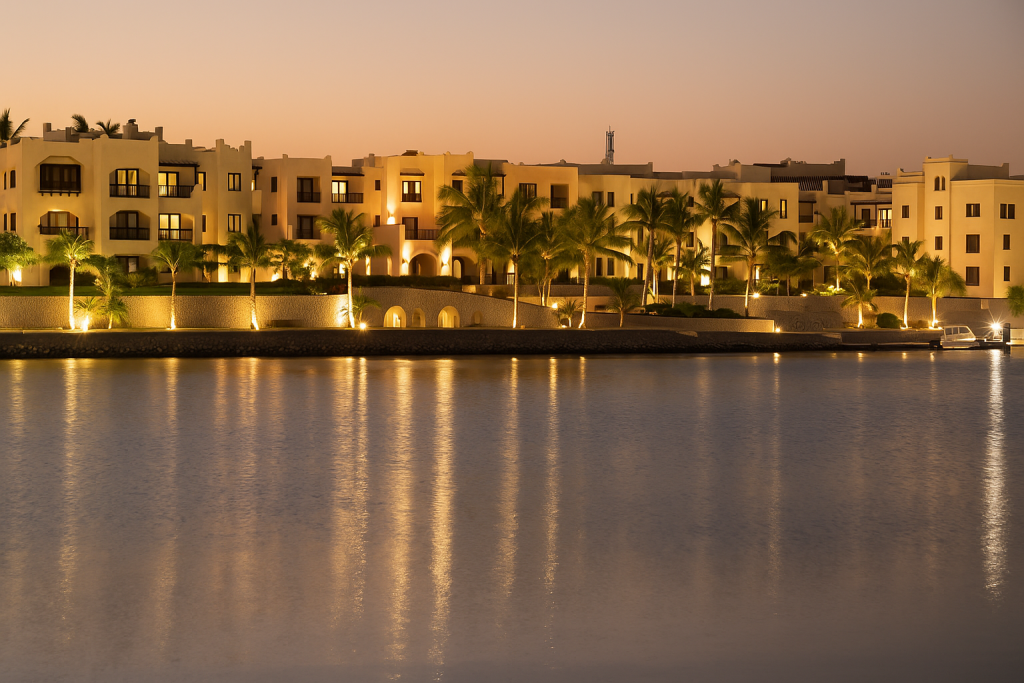Oman Visa Policies and Types
Oman has streamlined its visa regime to attract tourists and investors. Citizens of GCC states (Bahrain, Kuwait, Qatar, Saudi Arabia, UAE) enter Oman visa-free, and nationals of over 100 other countries may stay up to 14 days without a visa. Other visitors can apply via Oman’s Royal Oman Police (ROP) eVisa portal. The eVisa system issues Tourist/Visit Visas (unsponsored 30-day stays, extendable once), Business Visas, Student Visas, and Employment Visas. For example, the unsponsored Tourist Visit Visa is commonly used for independent travel. Key visa categories include:
Tourist/Visit Visas: sponsored or unsponsored, typically 30-day single-entry, extendable.
Employment (Work) Visas: sponsored by an Oman employer; see below.
Temporary Work Visas: for short-term assignments (4–6–9 months validity).
Family Joining Visas: for spouse and children of expatriates (valid 2 years).
Investor/Partner Visas: long-term residency via investment; see below.

Residence and Employment Options in Oman
Foreigners can reside in Oman primarily through employment or investment. Work visas are obtained by securing a job with an Omani sponsor and obtaining a Ministry of Manpower permit. A standard Employment Visa allows an expatriate to live and work in Oman for up to two years (renewable). A Temporary Work Visa (valid 4, 6 or 9 months) exists for fixed-term projects. Under Oman’s new labor law (2023/2024), expatriates are now permitted to change jobs under their existing work permit (with Ministry approval), and remote work from anywhere in Oman is allowed.
Expatriate employees may also sponsor dependents: Oman’s Family Joining Visa is valid for two years (multi-entry) for the foreign worker’s spouse and children under 21. Eligibility requires the sponsor to meet salary and housing criteria (for example, a minimum salary around OMR 600 per month and a suitable residence). Student visas are available for enrollment in Omani schools or universities.
Importantly, Oman’s Investor Residency Program provides an alternative residency route (see below). Investors can sponsor themselves and their families directly (without an additional local employer sponsor), giving 5- or 10-year residence in exchange for qualifying investments.
Trends in Migrant Workforce in Oman
Oman’s economy remains reliant on expatriate labor. Recent data show the foreign workforce growing: a 2023 report by Oman’s Vision 2040 unit notes about 1.8 million expatriates in Oman (a 7% increase year-on-year) compared to roughly 853,000 Omanis in employment. In total population terms (2018 census), expatriates comprised about 44% of Oman’s population, underscoring their vital role.
The government has balanced this growth with labor reforms. The 2023 labor law lifts previous restrictions (no-objection certificates and exit permits) by allowing expats to switch employers under their visa. Remote work is now officially permitted nationwide, a unique feature among Gulf countries. At the same time, Oman is sharpening “Omanization” rules: the Ministry of Labour now specifies which sectors and jobs must be filled by nationals and requires companies (25+ employees) to submit training and hiring plans for Omani workers. These measures, coupled with an amnesty for visa overstays through July 2025, aim to streamline the labor market while protecting citizen employment.
Residency via Company Registration (Investor Residency)
Oman encourages foreign investment by granting long-term residency through company formation or capital investment. Investors can establish a company (e.g. an LLC or PJSC) with 100% foreign ownership (no local partner needed). Under Oman’s Investor Residency Program, there are two tiers:

Tier One (10-year visa) – Minimum OMR 500,000 (~US$1.3M) investment. This can be through setting up a company (with at least 50 Omani employees), buying shares in an existing firm, purchasing government bonds, or acquiring real estate. A qualifying Tier One investment grants a 10-year residence permit.
Tier Two (5-year visa) – Minimum OMR 250,000 (~US$650k) investment in a company, real estate, or bonds. This yields a 5-year permit.
In both cases, the residency is renewable. Oman’s authorities explicitly state the 5- and 10-year permits are “subject to extension”. This means an investor can extend their stay by maintaining the investment. Renewal fees (e.g. OMR 500 for Tier One, OMR 250 for Tier Two) . Through this route, an investor effectively sponsors their own residency and that of eligible family members (spouse, children) on the same basis. Oman’s online investment portal and “Business Platform” make company registration efficient, further facilitating this option.
Benefits of Staying in Oman for Expatriates and Investors
Oman offers several advantages for foreign residents and investors. The business climate is investor-friendly: most sectors allow 100% foreign ownership, and the government provides incentives (corporate tax holidays in free zones, customs exemptions under trade agreements, etc.). The online Oman Business Platform streamlines licensing and permits. Importantly, Oman has no personal income tax, and the Omani Rial (OMR) is a strong, stable currency. Living costs are generally lower than in Dubai or other Gulf hubs, especially for housing and utilities.

Quality-of-life is a key draw. Oman consistently ranks as one of the world’s safest countries – Numbeo’s 2023 report placed Oman 4th globally for security (safety index 80.3). In an InterNations Expat survey (2021), Oman was rated #5 out of 59 countries for ease of settling in. The country’s clean environment, rich culture (see image above), and open society make it attractive to families. Residents have access to good healthcare and education facilities, and expatriates can own property in designated zones (e.g. Integrated Tourism Complexes).
For long-term residents, Oman grants freedom of movement: notably, holders of the Investor/Partner Residence Visa need no local sponsor and may travel in and out of Oman freely during their permit validity. (Oman’s entry system has also shifted to automated e-gates for resident card holders.) Additionally, Oman’s strategic location (gateway to the Arabian Sea) and improving infrastructure (new ports in Duqm and Salalah; Muscat airport expansion; free zones like Sohar) add to its investment appeal. In sum, foreigners in Oman benefit from a stable, tax-efficient environment with a high degree of safety and relatively low living costs, all backed by government policies that promote foreign investment.
Oman Residence Card (ID Card): Application and Usage
All expatriates legally living in Oman must obtain a Resident Card (Raqm Muqeem). By Royal Oman Police rule, this card must be obtained within 30 days of arrival. Children aged 10 and above (and many families even apply earlier) are also required to have their own card. To get the card, the expat visits the ROP Passports & Residences department with their passport, work contract or sponsor letter, medical exam certificate, and related documents. The fee is nominal: OMR 6 for a one-year card or OMR 11 for two years.
The Resident Card serves as the official proof of legal residency (Oman no longer stamps passports for visas), and it is required for most formal transactions. For example, the card must be shown at immigration checkpoints – Oman has implemented e-gate clearance using these cards at airports. Any delay in obtaining or renewing the card incurs a fine of OMR 10 per month. Thus, prompt application ensures smooth re-entry and compliance with Omani law.
Residency Fees in Oman
Oman’s visa and residency fees are generally transparent and reasonable. For work visas, the ROP charges OMR 20 for initial issuance. (Renewal typically requires resubmitting labor permits through the Ministry of Manpower.) Fines for late renewal are stiff: OMR 50 per month of overstay. For expatriate Resident Cards (see above), the cost is OMR 6 (1 year) or OMR 11 (2 years).
Under the Investor Residency Program, higher fees apply for the long-term cards: the charge for a 10-year investor residence card is OMR 551 (Tier One), and for a 5-year card OMR 326 (Tier Two). Renewal of these investor visas incurs renewal fees (approximately OMR 500 for Tier One, OMR 250 for Tier Two). Family visas for dependents under an investor permit have smaller fees (roughly OMR 100 or OMR 50 per renewal) according to official sources. In all cases, these fees are paid to Oman government authorities, usually by bank transfer or online payment during the application process.
Overall, Oman’s fee structure is competitive: for instance, the single-entry tourist eVisa (30 days) costs about OMR 20 (≈US$52), and a multiple-entry one-year visa is around OMR 50, rates comparable to other Gulf states. The modest cost of residency (no major stamp duties or hidden charges) combined with the low tax environment makes Oman a cost-effective choice for expatriates.
Duration and Renewal of Residence Permits
Typical Oman visa durations are: Work and Family Visas – up to 2 years (renewable); Temporary Work Visas – 4, 6 or 9 months; Investor Visas – 5 or 10 years. Tourist visas are generally 30 days (can be extended once). When a permit is nearing expiry, the resident (through their employer or sponsor) must apply for renewal at ROP with updated documents. For employment visas, renewal requires a new labor permit and employer sponsorship. For investor permits, renewal usually means demonstrating that the investment or company remains in good standing.

Renewals must be done before expiration to avoid fines. If renewal is delayed, Oman imposes penalties (for example, work visa renewal is usually charged as a fresh visa plus OMR 50 per month late fee). By contrast, the Investor Residency visas explicitly allow renewal by “extension” of the permit in practice, this means re-certifying the investment and paying the renewal fee. Thus, an investor can effectively maintain continuous residency by periodically renewing the permit (5-year Tier Two or 10-year Tier One) as long as the investment criteria are met.
Oman vs Dubai: Work, Life and Investment
For many expats and investors, the choice between Oman and Dubai (UAE) depends on priorities. Oman offers a more relaxed, affordable lifestyle with strong natural and cultural attractions, while Dubai is a major global business hub with world-class infrastructure. Key comparisons:
Cost of Living: Oman’s prices (especially housing and schooling) tend to be significantly lower than Dubai’s bustling metropolis. Daily expenses and rent in Muscat are often half those in Dubai.
Business Environment: Oman allows 100% foreign ownership in most sectors and has streamlined company registration. Dubai (and the UAE) also expanded 100% ownership rules recently, but traditionally many mainland businesses required a local partner. Both have numerous free zones. UAE’s larger economy and population mean more potential customers and networking, but Oman’s lower competition and fewer regulatory hurdles (no capital minimum, no labor quota for investors) appeal to many entrepreneurs.
Residency Options: Oman’s new Investor Visa offers 5- or 10-year permits at lower investment thresholds (OMR 250k/500k). The UAE Golden Visa runs 5–10 years as well, but usually requires higher investment (e.g. AED 10M+ for 10-year). Neither country currently offers straightforward citizenship by investment. Oman explicitly states investor visa holders do not gain citizenship, whereas UAE is also restrictive on citizenship.
Safety & Quality of Life: Both countries are very safe, but Oman ranks exceptionally high – Numbeo rated Oman 4th globally for safety (Dubai/UAE was also high on the list). Oman’s society is peaceful and family-oriented, which many expats value.
Connectivity: Dubai has a vast global network of flights (Emirates airline hub), which can be an advantage for international business. Oman is expanding Muscat International Airport, but has fewer direct flights worldwide.
Ultimately, Oman may appeal more to those seeking lower overhead and a stable, quieter environment, while Dubai suits those seeking fast-paced business and entertainment. Investors often cite Oman’s ease of doing business (digital permits, no local partner needed) as a plus. In summary, Oman and Dubai each have distinct advantages; choosing “better” depends on one’s work sector, family needs, and lifestyle preferences.
Frequently Asked Questions (FAQs) about Oman Residency and Visas
Q: What visa do I need to live and work in Oman?
A: You would typically obtain a work (employment) visa sponsored by your Omani employer. This visa (issued by Royal Oman Police) is valid for up to two years, provided the employer secures a labor permit for you. Spouses and children under 21 can then apply for Family Joining Visas (also 2-year validity) through that same sponsor. Alternatively, investors can qualify for long-term residency visas (5–10 years) by meeting Oman’s investment criteria.Q: Can I enter Oman on a visa-on-arrival or e-visa?
A: Yes. Oman offers e-Visas for many nationalities. Eligible visitors can obtain a 30-day single-entry Tourist Visa on arrival or via the online portal for about OMR 20 (≈US$52). If you hold a valid residence permit or visa from a GCC country, you may also be eligible for a special GCC Resident Tourist Visa without further documents. In all cases, you should check the current online ROP eVisa system for the latest requirements.

Q: How can I sponsor my family to join me in Oman?
A: Expatriates employed in Oman can sponsor a Family Joining Visa for their spouse and dependent children (<21 years). The sponsor must provide proof of employment, a minimum salary (around OMR 600/month), and adequate housing. Once approved, dependents receive a multi-entry visa valid up to 2 years, which is renewable upon renewal of the sponsor’s permit. Newborn children or older dependent relatives may have different provisions, but the basic rule is that legal dependents can usually reside under the expatriate’s sponsorship.Q: What are the main investment visas and how do they work?
A: Oman’s Investor/Partner Residency Program grants long-term visas in exchange for capital commitment. Two tiers exist: a 10-year visa for investments ≥OMR 500,000 (≈US$1.3M) and a 5-year visa for ≥OMR 250,000. Qualifying investments include company shares, government bonds, or in some cases real estate or job creation. The investor (and eligible family members) obtain a renewable residence permit for the stated term. Unlike a regular work visa, the investor’s own company (or investment) serves as the basis for immigration, and no Omani partner or employer sponsorship is needed.Q: How long are Oman residence visas valid, and can they be renewed?
A: Validity depends on the visa type. Standard work/family visas run for 1–2 years, after which the employer must apply for renewal (re-submitting labor permits and fees). Tourist visas (30 days) may often be extended once. The special Investor Residence Visas last 5 or 10 years. All renewable visas can be extended by meeting the original conditions: for example, renewing your investment visa by maintaining the investment (renewal fees apply). It is important to renew before expiry to avoid fines – Oman typically charges OMR 50 per month of delay.Q: What is the Omani Resident Card and how do I get it?
A: The Resident Card (Raqm Muqeem) is the official ID for all legal residents. You must apply for it within 30 days of your first entry. To apply, visit the ROP Passports & Residences office with your passport, sponsor letter/employment contract, and medical examination form. Pay the fee (OMR 6 for a 1-year card, OMR 11 for 2 years). You will then receive a smart ID card showing your visa status. This card is required for all official transactions and travel (Oman no longer stamps passports), and using it at the airport e-gates can speed your entry. Failing to obtain the card on time leads to fines (OMR 10 per month late).Q: Are expatriates allowed to bring domestic helpers?
A: Yes. Expatriate residents (especially investors or high-earning employees) may sponsor domestic worker visas for helpers such as maids, drivers or cooks. Oman’s rules typically allow one helper per valid sponsorship; investors can often sponsor up to 3 without extra salary conditions (though rules periodically change). The domestic worker visa is usually tied to the sponsor’s residency status.Q: Is Oman safe and suitable for families?
A: Oman is regarded as one of the world’s safest countries. Crime rates are very low and society is welcoming to foreigners. In fact, a global survey ranked Oman in the top five destinations for expatriates to live comfortably. Many families are attracted to Oman’s clean environment, good schools, and healthcare. While no country is without risk, Oman’s strong law-and-order (and the recent easing of visa requirements) make it very family-friendly.Q: Can foreigners eventually become Omani citizens?
A: Oman does not offer citizenship to foreign investors or most expatriates. The government’s statements clarify that the new Investor Residency cards do not confer any right to citizenship. Citizenship in Oman remains tightly restricted and usually requires many years of permanent residency, marriage to an Omani, or special decree. For most foreign residents, only residency (renewable permits) is available, not a direct path to citizenship.
These FAQs cover common concerns about Oman’s visas and residency. For specific cases, consult the ROP website or a legal advisor, but the above answers reflect Oman’s current regulations and policies.
Sources: Authoritative information has been drawn from Oman’s official portals and reputable news outlets, including the Royal Oman Police (ROP) eVisa guidelines, Oman’s Investment Authority announcements, and local media reports. All figures (fees, durations, requirements) are current as of 2024–2025.
